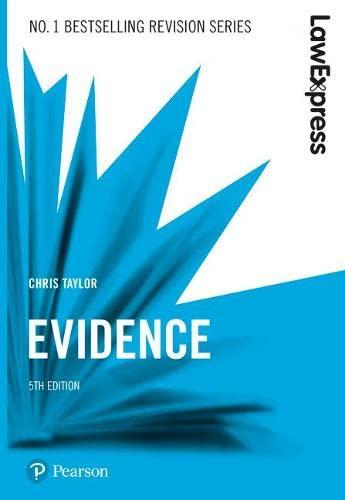Question
STATEMENT OF THE ISSUES: Vance and two accomplices robbed two banks in 2007. During one of the robberies, Vance shot and killed a bank teller.
STATEMENT OF THE ISSUES:
Vance and two accomplices robbed two banks in 2007. During one of the robberies, Vance shot and killed a bank teller. Unlike his two co-defendants who each pleaded guilty and received a 20-year prison sentence, Vance stood trial. A jury convicted him of three counts of bank robbery, 18 U.S.C. 2113(a), (d); bank robbery resulting in a killing, 18 U.S.C. 2113(a), (e) (life sentence); and two firearms charges under 18 U.S.C. 924(c) (then a 25-year statutory minimum sentence). He was sentenced to life plus 384 months in prison. We affirmed.See United States v. Vance, 764 F.3d 667 (7th Cir. 2014).
In 2021, Vance moved for compassionate release under 3582. He argued that release was justified because (1) he would have received a more lenient sentence today because 403 of the First Step Act removed the 25-year minimum sentence for multiple 924(c) violations committed by an offender not previously convicted under 924(c); (2) 2113(e) is unconstitutionally vague; (3) the testimony of his co-defendants at trial was not credible and should not have been admitted; (4) his co-defendants received much shorter sentences than he did; and (5) he has undertaken extensive rehabilitative efforts in prison.
ARGUMENTS OF THE PLAINTIFF:
On appeal, Vance faults the district court for not addressing three considerations. First, he argues that the court did not account for the far more lenient sentences of his co-defendants. But courts need not address arguments such as this that are "too weak to require discussion."United States v. Joiner, 988 F.3d 993, 995 (7th Cir. 2021). A sentencing disparity is not impermissible when it is created because some defendants cooperated with the government or pleaded guilty while another defendant did not.See, e.g.,United States v. Solomon, 892 F.3d 273, 279 (7th Cir. 2018);United States v. Orlando, 819 F.3d 1016, 1026 (7th Cir. 2016).
Second, Vance asserts for the first time that the court did not consider his prison's management of COVID-19 and the mental stress created by the pandemic. But he forfeited this argument by not raising it in the district court.See United States v. Martin, 21 F.4th 944, 945 (7th Cir. 2021).
Third, Vance says that the court failed to apply the sentencing factors set forth in 28 U.S.C. 3553(a). But a district court need consider the 3553(a) factors only if it first determines that the movant has presented an extraordinary and compelling reason for release,see United States v. Ugbah, 4 F.4th 595, 597 (7th Cir. 2021), and the court here found no such reason.
ARGUMENTS OF THE DEFENSE:
We have agreed to decide the case without oral argument because the briefs and record adequately present the facts and legal arguments, and oral argument would not significantly aid the court. FED. R. APP. P. 34(a)(2)(C).
abuse its discretion in concluding that he had not presented an extraordinary and compelling reason for release, we affirm.
HOLDING OF THE COURT:
The district court denied the motion. The court determined that changes to sentencing law, including the First Step Act's change to 924(c), did not justify release underUnited States v. Thacker, 4 F.4th 569, 576 (7th Cir. 2021). With regard to Vance's arguments about 2113(e) and his co-defendants' testimony, the court explained that both arguments had been rejected on direct appeal,see Vance, 764 F.3d at 674-76, and that these rulings were law of the case. As for Vance's rehabilitation efforts, the court found these commendable but insufficient to justify compassionate release.
Step by Step Solution
There are 3 Steps involved in it
Step: 1

Get Instant Access to Expert-Tailored Solutions
See step-by-step solutions with expert insights and AI powered tools for academic success
Step: 2

Step: 3

Ace Your Homework with AI
Get the answers you need in no time with our AI-driven, step-by-step assistance
Get Started


